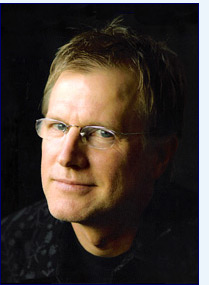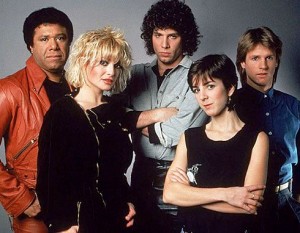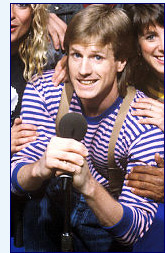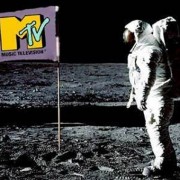“THE ROCKET BLASTED OFF,” Alan Hunter remembers, “and we looked at each other and realized we were the only five people on the planet doing what we were doing.”
My favorite book of 2012 was I Want My MTV: The Uncensored Story of the Video Revolution, but it left me wanting more—more from that golden era of the five original VJ’s, from those tawdry innocent days of Michael Jackson and Diamond Dave, when “Music Television” implied television that played music, with on-air personalities who felt like friends and neighbors, before it became home to knocked-up teens and boneheads from Jersey.
I recently caught up with vintage video jock Alan Hunter to discuss those glorious early days and the new oral history of that iconic era, VJ: The Unplugged Adventures of MTV’s First Wave (Atria Books).
 JMB: What might pop culture look like today without the early days of MTV?
JMB: What might pop culture look like today without the early days of MTV?
AH: Young people would talk in full sentences, pay attention in school, wear really bland clothing and value substance of character.
There’s a notion that MTV betrayed us all and became something awful. When did MTV jump the shark?
Depends on one’s definition of “awful.” Some would argue that the insanity began August 1, 1981 at MTV’s beginning and went downhill from there. And wasn’t that the wonderful point of it? De-evolution as Devo would suggest—a counterpoint to the expanding Reagan-era conservatism of the country. But in terms of MTV’s evolution, from video jukebox to purveyor of reality programming, I’d say the early seeds were growing during those Spring Break shows or the “Amuck in America” trip I did in 1986.
Tell me about meeting Madonna when you were more famous than she was.
Ha! It was a busy day at MTV and (original VJs) Martha (Quinn), Nina (Blackwood) and I were in the greenroom at the studios, chilling. A producer came in and said he needed someone to interview Madonna that night at the Limelight Club in Midtown. I think the ladies scattered before I could claim some conflict. It’s not that I didn’t like her, I just wanted to have the evening off. So I got there about 9pm, met up with our producer and caught up with her before the show. We were in the middle of backstage chaos so the interview was very unstaged. She was cordial, unaffected, unhandled and in a way, raw— but not unpolished. She had a sense of herself and seemed to know instinctively how to handle an interview. Nothing extraneous. To the point, a little flirty and definitely confident. Nonetheless, I’m not sure I stayed for the show. I should have. Sorry Madge, I’ve loved you ever since.
 You interviewed Ozzy, U2, Lou Reed, Joey Ramone, Andy Warhol, Boy George, KISS, Hugh Hefner, Rod Stewart — many of the stars of that era. Which ones stick out in your mind as surprising or exceptionally articulate or maybe even especially clueless to their status and surroundings?
You interviewed Ozzy, U2, Lou Reed, Joey Ramone, Andy Warhol, Boy George, KISS, Hugh Hefner, Rod Stewart — many of the stars of that era. Which ones stick out in your mind as surprising or exceptionally articulate or maybe even especially clueless to their status and surroundings?
Ozzy was clueless when I interviewed him because he was either A) on cold medicine, as Sharon (Osbourne) stated when he entered the studio, or B) in Ozzy fogland. I really prepped for the interview because I loved his music and after a cordial but frenzied howdy—there were quite a few in his nervous entourage—I cranked out my first proud question. His response was incomprehensible. I mean, no one could understand what he was saying. Our producer whispered in her headset to the director. We stopped tape and she came over and whispered in my ear something like “good luck.” I went with the flow thereafter, questions be damned. I just tried to hang on to the Ozzy crazy train.
Growing up, you were like my TV big brother. So the section in the VJ book about trolling spring break with cocaine in your pocket, looking for a party— any party—kinda traumatized me….
Well, it was traumatizing to me, at least in retrospect. Like anyone in the midst of doing some kind of mind-altering substance, it made total sense at the time. Later, you wonder what the fuck you were thinking. Honestly, I was pretty low-key about my debauchery, especially on my own down in Daytona with crazy college kids all around. No one was harmed, I didn’t embarrass myself, too much. And by the way, that was all pre-production Spring Break, by a couple of days. I was always a good boy when the show went live for the week.
What’s the quintessential MTV video from the classic era and why?
Yipes. Very hard to define, especially when you start to get into the mid-80s. At that point all the artists or rather, their video directors, were trying to find the new paradigms. The typical early videos from Rod Stewart or Pat Benatar were working on the literal narrative — translating the words of the song into images on the screen. Early pioneers like Bowie were not so leashed to the literal, “Ashes to Ashes” for example. Although, “Fashion”, which I was in, was all about “a new kind of dance,” so not as groundbreaking. Of course, the flip side to the linear story-driven concept video was a concert or pseudo live performance video, which worked well for bands that didn’t want to perform or act. Like Journey should have done for their first video for “Separate Ways.” Unfortunately they acquiesced and gave in to a director with the nutty idea that they should play air instruments on the wharfs in New Orleans, and it became a much ridiculed video—Beavis and Butthead circa 2001 maybe?
(Ed note: B&B slagged Journey in the 1993 episode of Buff & Stuff. In 1999 MTV chose it as 13th on its list of the “25 Worst Videos of All Time.” Keyboard player Jonathan Cain explains, “It all looked normal in 1982.”)
 Break down your personal favorite from that era, why it brings you back and why you think it represents those times so appropriately.
Break down your personal favorite from that era, why it brings you back and why you think it represents those times so appropriately.
Well we all have our favorites. The ones I gravitated to the most were the non-literal, non-linear ones. Rod Stewart videos that translated the narrative in a very literal way weren’t my faves, as much as I loved the young Turk. “Once in a Lifetime” from Talking Heads (is) one of my top five. For multiple reasons. No overwrought concept, just a memorable song and David Byrne being his compelling, goofy self, in the best possible way. Peter Gabriel’s work was always interesting and fun. From “Shock the Monkey” to “Sledgehammer” or “Big Time”— always pushing the creative.
What MTV acts from the 80s do you think were overlooked?
Oh, I don’t know. I think heavy exposure with MTV and the rabid, 24/7 way the audience gorged on the programming served as a vetting mechanism for music worthy of some longevity and what music should wither and die. People said in the beginning that the video would ruin the music. In some cases I think it was possible that the video helped prop up an otherwise lame song, but for the most part if the song wasn’t good and hummable, the audience would grow tired and dismiss it. Those bands that didn’t make it past the 80s or didn’t otherwise achieve success in the 80s, deserved what they got. Of course, there were many groups that never got on anyone’s radar because they weren’t exposed on MTV. That was the unfair nature of having such a monopolizing force called MTV.
This tidbit from the I Want My MTV book amazed me: “By far the heavy metal bands were the most polite, punctual and professional we worked with at MTV.” Can you comment on that from your experience?
I’d say it speaks to the misperception that being a metal band meant that the artists who played that kind of music were somehow less dedicated to their music, to their craft. To the business of being in a band. New Wavers and pop singers could be just as petulant and unprofessional as the rest of them. I found Lemmy from Motorhead, or the guys from Quiet Riot, to be sweethearts. Even Paul Stanley and Gene Simmons were complete gentlemen, obviously. They created theatre and knew where their bread was buttered. No band or artist could be a true jerk or revolutionary like the Sex Pistols and make it in the 80s. Maybe that’s a shame, but the times and the demands of making music and then producing all the peripheral material necessary for success in the 80s was not for the irresponsible or unmotivated. Perhaps that was the upside of the decade.
Quote of yours from the book: “After going to Russia with Billy Joel, it was hard to summon the gee-whiz attitude needed for a Dairy Queen spot.” I always wondered what your life was like in the five years after MTV was over.
No doubt the MTV ride was a fabulous one. Never expected to get such a gig at 23, nor have it for six years. So the pigeon-hole of being a VJ was a hindrance when it came to navigating Hollywood in the following years. Where else was I going to find a new skin as well-fitting as MTV? At least for a while anyway. It took me a few years to shed that persona and get back to a real me. Or really to invent the next phase of me. After a few years I regained my footing and started the entrepreneurial phase of my life—as a director of theatre and commercials, an independent film producer and business owner. And lately back to hosting and voice-overs. And of course radio on SiriusXM. I’ve worn a lot of different clothes and exercised a lot of different aspects of my personality. I’m comfortable with them all and happy even when some of them didn’t work out.
http://www.youtube.com/watch?v=pi_UEj5Nxtw




I remember the day MTV went live and I vividly recall my excitement as these then-unknown VJs explained what MTV would be all about and what we could expect from this new institution. Those early days were genre-free: pop, dance, metal, soul, new wave and rock all looped together throughout the day and into the wee hours of the morning, when they still broadcast! How cool was that?
This interview brought me back to that time and those first early years before those VJs became celebrities in their own rights. I hope nobody ever loses sight of how important MTV was to music in those first few years.
In the meantime, Alan’s answers are insightful and entertaining.
Right, I’m off to listen to “Big City Nights” now.
Ah, Headbanger’s Ball.
And all that other stuff!
Skid Row into Ministry into Midnight Star
If you had told me
when I was a little kid
watching MTV
that I would one day
interview Alan Hunter I would have been like
no way…..
Wonderfully written tale. It will probably be beneficial to anyone who usess this, including the one you have truly. Continue the favorable work rapid can’r wait and learn more content.
What was really interesting
about this era
was the two least likely to succeed
(Martha & Alan)
became the favorites.
Not the vixen or the cool guy rock DJs.
Sneaking MTV while my parents were upstairs may have been the one thing that ultimately turned me into a real human. Without it, it is possible I may have never moved out of my parents’ house. I also might never have learned how to moonwalk, do the Hammer or how to answer the question of “what do you wanna do with your life?” Thanks, MTV.
(Wow, Blaine…Alan Hunter!)
Pingback: Rock and Roll Coffee: An Interview with Al Jourgensen | The Weeklings
Pingback: Rock & Roll Coffee: Kip Winger on Super-Muso Hair Metal, Scoring Ballet & Making Peace with Beavis | The Weeklings